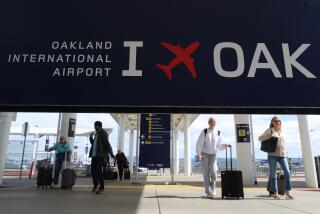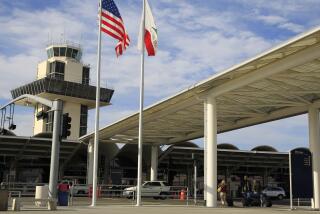San Francisco International On the Mend
- Share via
Air New Zealand announced Monday that it would begin nonstop flights from San Francisco to Auckland, the latest sign that the city’s international airport may be starting to recover after several difficult years in which passenger traffic plunged nearly 30%.
First the dot-com economy went bust, and travel spending by the region’s businesses slowed to a trickle. After the Sept. 11 terrorist attacks in 2001 came a decline in travel, and the airport’s biggest carrier -- United Airlines -- drastically reduced the number of flights after its parent company filed for Bankruptcy Court protection.
The threat of war, and then war itself, caused even more people to stay close to home. And the outbreak of severe acute respiratory syndrome, or SARS, in Asia hurt SFO’s international business, much of which centers around the Pacific Rim.
But now the airport is showing new signs of life, and San Francisco Mayor Gavin Newsom happily made the New Zealand announcement with airport and tourism officials at a City Hall press conference.
“San Francisco is open for business, and in particular our international airport is open for business,” Newsom said.
After more than four years of discussions with airport officials, Air New Zealand said it would begin offering three weekly nonstop flights to and from SFO in June, in addition to its existing service out of Los Angeles and Honolulu. Airline Vice President Gus Gilmore said he expected the new service to draw increased stopover passengers from Europe.
Last June, the long-awaited expansion of the Bay Area Rapid Transit system, the regionial subway line, made it easier and cheaper than ever to travel to and from the airport (which is located south of San Francisco in the city of San Bruno) from San Francisco and the East Bay. BART ridership at the airport has averaged more than 6,000 passengers a day, according to agency spokesman Mike Healy. Trains arrive every 15 minutes, and for $4.95 travelers can get from the airport to downtown San Francisco in 29 minutes.
And for the first time since the Sept. 11 attacks, SFO has seen an uptick in its passenger loads in recent months. “It’s slow, but each month it’s a little better, and each month is a little better than it was for the same time last year,” said Kandace Bender, the airport’s deputy director.
In November, passenger traffic increased 5% over a year earlier and December’s traffic is expected to show improvement.
Still, passenger traffic at SFO continued to decline in 2003, falling 6% from 2002, Moody’s Investor Service said Monday. Overall, traffic is 27% lower than the high achieved in 2000, making SFO’s declines one of the most severe in the U.S. Moody’s ratings of the airport’s bonds carry a negative outlook because of the slow recovery in traffic.
But even Moody’s concedes that recent developments are encouraging. In August, SFO began offering a 50% discount in landing fees for one year to any airline initiating new service to a previously unserved market. That led to six carriers offering new service, including budget carriers America West, AirTran and ATA.
That should help attract more low-fare flights, which analysts say is crucial for SFO.
Ray Neidl, an equity analyst with Blaylock & Partners in New York who follows the airline industry, said carriers consider SFO an expensive airport in which to operate, which is why it has had trouble gaining ground among the low-cost airlines.
But now SFO, Bender said, is aggressively courting low-cost carriers. “It’s very clear that the low-cost carriers are part of the wave of the future,” she said. Yet while only 10% of San Francisco’s flights are via low-cost carriers, 75% of Oakland’s passengers fly on budget airlines.
JetBlue Airways and Southwest Airlines, the two most popular low-cost carriers, offer flights from Oakland International Airport. And San Francisco residents have increasingly traveled across the bay or south to San Jose’s airport for lower fares.
“It goes without saying that San Francisco is going about aggressively marketing itself,” Newsom said.


